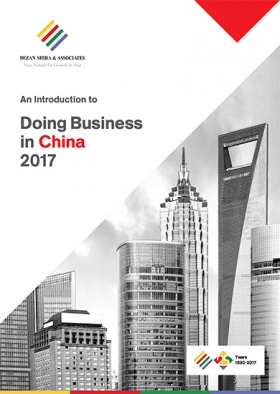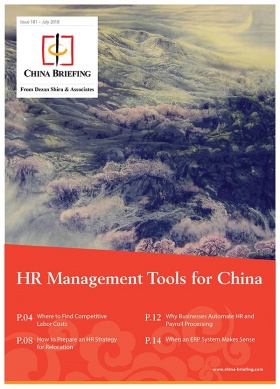China-Africa Trade to Benefit from Growing Economic Cooperation
Chinese President Xi Jinping recently completed a week-long trip to Africa, where he visited Senegal, Rwanda, South Africa, and Mauritius.
During the trip, Xi discussed and signed new trade and investment deals with these countries, in an effort to capture greater opportunities for the Belt and Road Initiative.
This latest trip to Africa is yet another sign of China’s growing engagement with the continent and reinforced its role as one of Africa’s closest economic and diplomatic allies.
This Sino-African relationship dates back to the early days of the People’s Republic and has deepened in line with China’s need for natural resources to sustain its economic boom and rapid industrialization.
Seemingly indifferent to the risky investment and political structures of the countries that make up much of the continent, China has boosted oil and mining sectors in Africa in exchange for advantageous conditions of trade.
Sino-African relations
In 2000, representatives from 44 countries and 17 international and regional organizations joined the first Summit of the Forum on China-Africa Cooperation (FOCAC).
The inaugural FOCAC summit represented a landmark in Sino-African cooperation, triggering soaring bilateral political and economic interactions between China and individual African countries.
Since the first FOCAC summit, bilateral trade, aid, and investment have increased rapidly, and political relations are more interconnected than ever before.
This is of immense significance for Africa’s political and economic development.
Many African leaders consider China to be instrumental in solving their development challenges. Meanwhile, the US and the EU are being pushed out of the picture and face a renewed need to reposition themselves strategically in the continent.
In recent years, the FOCAC has played an increasingly significant role in the integration of the Chinese and African economies, which are highly complementary and hold tremendous potential for bilateral trade and investment.
Partly due to the FOCAC’s efforts in supporting and streamlining Sino-African trade, China is now Africa’s largest trade partner.
Bilateral trade
Factoring into the Sino-African equation is the Least Developed Country (LDC) state of many African countries.
Exporters from LDC countries can enjoy the benefits of preferential tariffs agreement from China granted by the Administrative Measures of the PRC Customs on Rules of Origin of Imported Goods from the Least Developed Countries Entitled to Special Preferential Tariff Treatment (GACC Decree no. 231, ‘’the Decree”), passed on March 3, 2017 and effective since April 1, 2017.
The perks of the Decree consist in the expansion of the criteria determining the national source of a product, and in a more streamlined consignment process, making the delivery of goods from such countries to China more efficient.
While Chinese exports include manufactured goods like machinery, electronics, textiles, and high-tech products, African exports mainly consist of natural resources like timber and cotton, and agricultural and semi-processed goods.
The above map highlights the major categories of products exported from Africa to China in 2017.
In the east, food products such as livestock, coffee, and grains are the biggest exports to China.
Textiles, once dominant in North African countries like Morocco and Tunisia, have been surpassed by ores and plastic goods, respectively.
Export of cotton products remained strong for the smaller economies of Mali and Benin, while Niger experienced explosive growth in its cotton export levels.
In the south, ores and other precious metals still constitute the largest sources of revenue.
The future of the cooperation looks bright. But as China’s economy shifts from manufacturing to consumption, Africa’s oil and ferrous metal exporters (especially in Nigeria, Angola, and the Republic of Congo) are expected to experience a downturn in their export volumes, even though Chinese investments in Africa might compensate with infrastructure and industrial capacity building.
For instance, the establishment of Africa’s largest textile industrial center, sponsored by a Memorandum of Understanding between Kano State (in northern Nigeria) and Shandong Ruyi Technology Group – a deal worth US$600 million and potentially 5,000 jobs – can be considered as hedging a fall in oil prices and a lower supply of oil.
Outlook for future exports
However, it’s not just oil and gas. Africa’s exporters of non-ferrous materials, textile, and food and agricultural products – which are already enjoying eased access to the Chinese market – can expect their potential to be further unleashed by the expansion of the Chinese middle class.
African exporters must carefully assess the requirements of the Decree, consisting mainly in a new and eased Rule of Origin, further shaped by the Rule of Cumulation and by the Rule of De Minimis, as the present state of the global economy and its intricate value chains can poise some regulatory challenges.
Companies entitled for the qualification of such preferential measures should perform due diligence when planning to export goods to China, getting the relevant licenses, and be agile in making adjustments when needed given the fast pace at which regulatory updates are being brought forward by Chinese authorities.
As time goes by, the cooperation between African countries and China will most likely create many more opportunities for African businesses. Yet, a major drawback of the cooperation could consist in the overreliance of a given country on a given commodity.
Major efforts by the governments of export-oriented countries are expected to be involved into the diversification of their economies and into the design of an accurate “China plan”, as the Middle Kingdom’s economic model continues to shift.
In this sense, the seventh FOCAC Summit, to be held in Beijing next September, is likely to shed more light on the ties between Africa and China and lay out more precious considerations on the future of the cooperation while also considering its linkage with the Belt and Road Initiative.
About Us
China Briefing is produced by Dezan Shira & Associates. The firm assists foreign investors throughout Asia and maintains offices in China, Hong Kong, Indonesia, Singapore, Russia, and Vietnam. Please contact info@dezshira.com or visit our website at www.dezshira.com.
- Previous Article Intra-group Service Fee Treatment in China
- Next Article Россия и Китай создали новый инвестиционный фонд в местной китайской валюте – Юанях – для поддержки Дальнего Востока России и Северо-востока Китая.









